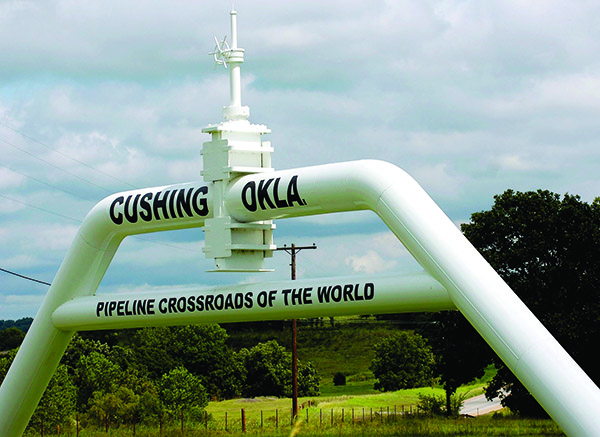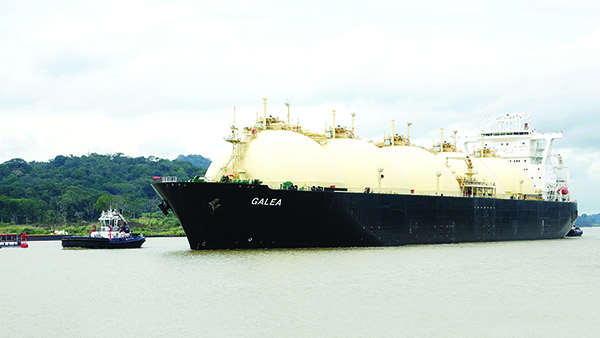August 2018, Vol. 245, No. 8
Global News
Global News
Cushing Bottleneck Could Increase U.S. Oil Discount
WTI prices have already been depressed at Midland, Texas, as surging Permian Basin production overtakes pipeline capacity to Gulf Coast markets. Now, oil traders and analysts are concerned that an emerging bottleneck at the key storage hub in Cushing, Okla., could result in further discounting of U.S. crude to global benchmark Brent.

U.S. crude production continues to reach record highs, and the Permian Basin is responsible for most of it. As pipelines to the Gulf Coast fill up and operators rush to add capacity, more Permian crude is going to Cushing. The bottlenecks will likely remain until the end of 2019 or early 2020, when about 2.4 MMbpd of Permian-to-Gulf pipeline capacity is added.
But northbound pipes are already nearing capacity, and pipeline use from Cushing to the Gulf Coast reached 92% of capacity by early June, according to market intelligence firm Genscape, compared with about 89% in April and 88% in May.
Cushing inventories have been held in check thanks to Midwest refiners who are processing record amounts of crude to meet summer demand. If inventories build, however, analysts predict the difference between WTI and Brent could widen. Raymond James expects a spread of $15 per barrel by the end of 2019 on North American output growth.
“The production growth in the U.S. is just going to continue to overwhelm the infrastructure buildout,” said Vikas Dwivedi, global oil and gas strategist at investment bank Macquarie.
Help is also coming from Canada, which is ramping up production of heavy crude. As refiners are in search for “a similar spec Venezuelan crude,” RBC Capital Markets said in a note, these heavier Canadian barrels are being prioritized over abundant light shale on Cushing pipelines.
France to Allow Private Investors to Buy into GRTgaz Gas Grid
A planned parliamentary bill in France will allow gas utility Engie to sell part of the main French gas grid, GRTgaz, to private investors, as the government considers a series of privatization moves to boost the economy.
The new law will allow the state-controlled investors to jointly hold only a majority stake in GRTgaz, Reuters reported, rather than the entire capital, according to a version of the bill cited by top French court Conseil d’Etat.
The gas grid, which manages most French gas pipelines and storage sites, is currently 75% owned by Engie, with the remaining 25% owned by state investor Caisse des Depots and insurer CNP.
A separate, smaller French gas grid company in the southwest of the country, TIGF, is controlled by Italy’s Snam, Europe’s biggest pipeline operator, which has a strategic alliance with Belgium’s Fluxys.
EnLink to Build New Delaware Basin Gathering System
EnLink Midstream will construct a crude oil gathering system in the Northern Delaware Basin called the Avenger Crude Oil Gathering System. The project is anchored by a 10-year contract with Devon Energy and supported by dedications from Devon’s Todd (Eddy and Lea counties, N.M.) and Potato Basin (Eddy County, N.M.) development areas.
EnLink plans to invest $35 million to $40 million in the development during 2018. These additional capital expenditures are incremental to the previously issued 2018 capital expenditures outlook.
Further expenditures are expected as Devon continues to develop its acreage in the region. Initial operations are expected to commence during the third quarter of 2018, and be completed in the first quarter of 2019.
Avenger is the third crude oil gathering platform in a high-growth basin that EnLink has announced over the last two years. EnLink is not constructing or operating Avenger.
First Gas Arrives in Turkey Through Pipeline from Azerbaijan
The Turkish and Azerbaijani presidents inaugurated a key pipeline carrying natural gas from Azerbaijan’s gas fields to Turkish markets and eventually to Europe, part of a wider Southern Gas Corridor project that aims to diversify gas supplies and reduce countries’ dependence on Russia.
The Trans Anatolian Natural Gas Pipeline, or TANAP, is also part of Turkey’s ambition of becoming a major energy hub. It will deliver 6 Bcm of gas per year to Turkey and 10 Bcm to Europe. Plans call for the pipeline to be connected to the Trans Adriatic Pipeline, or TAP, at the Turkey-Greece border Erdogan in mid-2019.
Turkey’s Recep Tayyip Erdogan said the pipeline will ensure energy security and increase the “welfare of the people on its route.” Although it has no financial involvement, the United States has strongly supported TANAP, said Sandra Oudkirk, the U.S. deputy assistant secretary of State for Energy, who also attended the ceremony.
“We take energy security for ourselves and allies and partners really seriously and we see this as an important component of the bigger energy diversification and energy security picture,” she said.
Pipeline Protesters Sentenced to Probation, Prison
Two pipeline protesters have been sentenced to federal prison and a third to probation in separate cases related to the Dakota Access oil pipeline.
Most recently, a Denver woman accused of firing a gun during a protest in North Dakota was sentenced to four years and nine months in federal prison. Red Fawn Fallis, 39, a member of the Oglala Sioux tribe, was accused of firing a handgun three times while resisting arrest in October 2016. No one was hurt. She pleaded guilty to civil disorder and illegal possession of a gun by a convicted felon, a charge related to her 2003 conviction in Colorado for driving a car for a man who shot and wounded another.
In another North Dakota case, Michael Giron was sentenced to three years in federal prison after pleading guilty to a reduced charge of civil disorder in a plea agreement with prosecutors. The 45-year-old Denver man, who also goes by the name Little Feather, was part of a group accused of putting barricades on a highway in 2016.
In Minneapolis, Karl Zimmerman Mayo, pleaded guilty to creating a public nuisance when he unfurled a banner protesting Dakota Access from the rafters of U.S. Bank Stadium during a Minnesota Vikings game. Mayo, 35, initially faced misdemeanor charges of trespassing and burglary.
Protesting Professor Removed from Mountain Valley Perch
A university professor faced trespassing charges after locked herself to a piece of construction equipment to protest the Mountain Valley Pipeline was removed and arrested, according to Virginia State Police.
Authorities said Emily Satterwhite, an Appalachian studies professor at Virginia Tech, tied herself to a piece of equipment 20 feet above the ground Thursday morning on Brush Mountain in Montgomery County.
Top German Court Rejects Bid to Block Gas Pipeline
Germany's highest court has rejected a bid by an environmentalist group to block construction of the planned Nord Stream 2 pipeline, which would pump Russian gas to Germany under the Baltic Sea.
The Nord Stream 2 project will add to an existing direct Russian-German pipeline, increasing the amount of natural gas Russia can send to central Europe skirting transit countries to Germany's east. Several eastern European countries object to the plan, which the United States also opposes.
The Naturschutzbund Deutschland environmental group filed a suit to the Federal Constitutional Court challenging a lower court's rejection of its bid for an injunction blocking permission for construction in German waters.
Enterprise to Develop Offshore Texas Crude Oil Export Terminal
Enterprise Products Partners is planning to develop an offshore crude oil export terminal off the Texas Gulf Coast, which could include 80 miles of 42-inch pipeline to an offshore terminal capable of loading and exporting crude oil at about 85,000 barrels per hour.
The terminal would be capable of fully loading very large crude carriers (VLCC), which have capacities of 2 MMbbls and provide the most efficient and cost-effective solution to export crude oil to the largest international markets in Asia and Europe.
The company has started front-end engineering and design (FEED) and preparing applications for regulatory permitting.
Enterprise completing the second partial loading of a VLCC tanker at its jointly owned Seaway marine terminal in Texas City. The Eagle Victoria is loading about 1.1 MMbbls of crude oil at the Texas City facility.
“On the heels of our second successful loading of a VLCC at the Texas City terminal, we are now planning to expand our capabilities to load crude oil faster and more cost efficiently without the need for lightering vessels,” said A.J. “Jim” Teague, CEO of Enterprise’s general partner.
New Panama Canal Rules Support more LNG Traffic
The Panama Canal is clearing the way for expanded LNG tanker traffic with new rules that may prove a boon to U.S. East Coast producers seeking increased sales to Asia.

Under new rules taking effect in October, the Panama Canal will permit night crossings by carriers and scrap its single-file rule to enable passage in opposing directions at the waterway’s north end. This is in addition to an existing policy to allocate passage slots to LNG vessels that arrive without a booking when possible. The Canal Authority expects to be able to offer three bookings a day for LNG carriers in 2022.
“By lifting these restrictions on Oct. 1, the Canal will unleash even more capacity for LNG,” Silvia de Marucci, executive manager, Economic Analysis and Market Research Division, said in a statement. This is on top of the Canal’s existing policy to allocate, where possible, passage slots to LNG tankers that arrive without a booking.
Shipments of LNG through the Panama Canal began to rise after a third set of locks was added in 2016, and the authority projects growing demand for the fuel will boost transits through the early part of the 2020s. The waterway regularly transits two LNG vessels in the same direction in the same day, and in April transited three in a line.
LNG transport through the Panama Canal is a closely watched issue in the United States, where the number of operating export terminals is expected to increase from two currently to six within about two years. Forecasts call for about 60 million tons of LNG to pass through the canal in 2019, with 75% of that volume from the United States.
Safety Board: Damage During Installation Led to Pipeline Crack
The National Transportation Safety Board (NTSB) says a fatigue crack caused last year’s rupture of the Keystone oil pipeline in South Dakota
The NTSB said in a report released Thursday that the crack likely originated from mechanical damage to the pipe exterior caused by a metal-tracked vehicle during installation. Investigators say the crack grew to a “critical size” and resulted in the Nov. 16 rupture near Amherst.
An estimated 210,000 gallons of oil spilled from the TransCanada Corp. pipeline between the Ludden, N.D., and Ferney, S.D., pump stations. There were no injuries associated with the incident.
TransCanada spokesman Matthew John says the impacted property has been cleaned up and the pipeline has returned to service. John says the company is committed to achieving its goal of “zero incidents.
Erosion Temporarily Halts Mountain Valley Construction
Construction of the Mountain Valley Pipeline in Virginia has been halted to address some soil erosion problems. Construction will resume with approval from Virginia’s Department of Environmental Quality (DEQ).
DEQ officials said the pipeline will direct crews to enhance and restore erosion and sediment controls along the route.
Pipeline officials said recent heavy rainfall affected crews’ abilities to control erosion. Pipeline officials said they take “environmental stewardship responsibilities very seriously.”
The $3.5 billion, 300-mile pipeline will run through West Virginia and Virginia. It’s scheduled to be in service by the end of the year, although there are legal challenges still pending. P&GJ





Comments